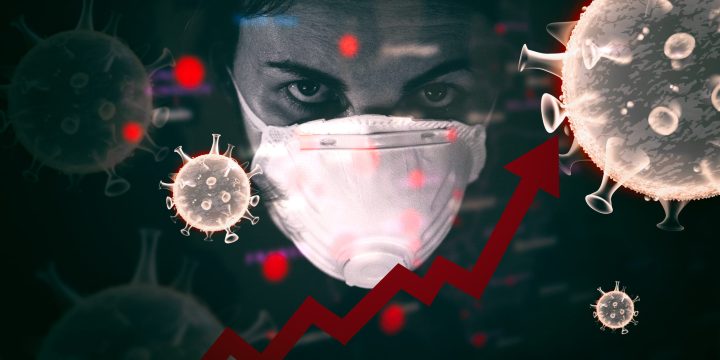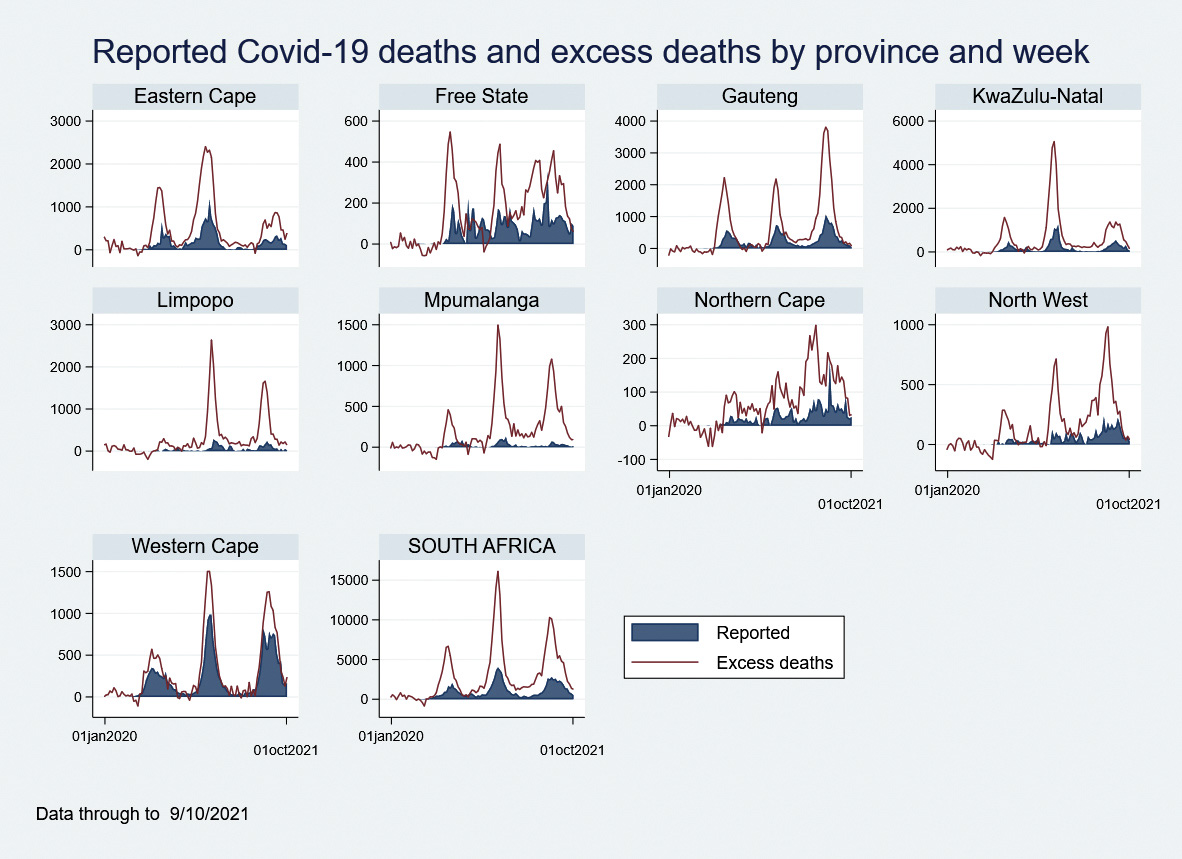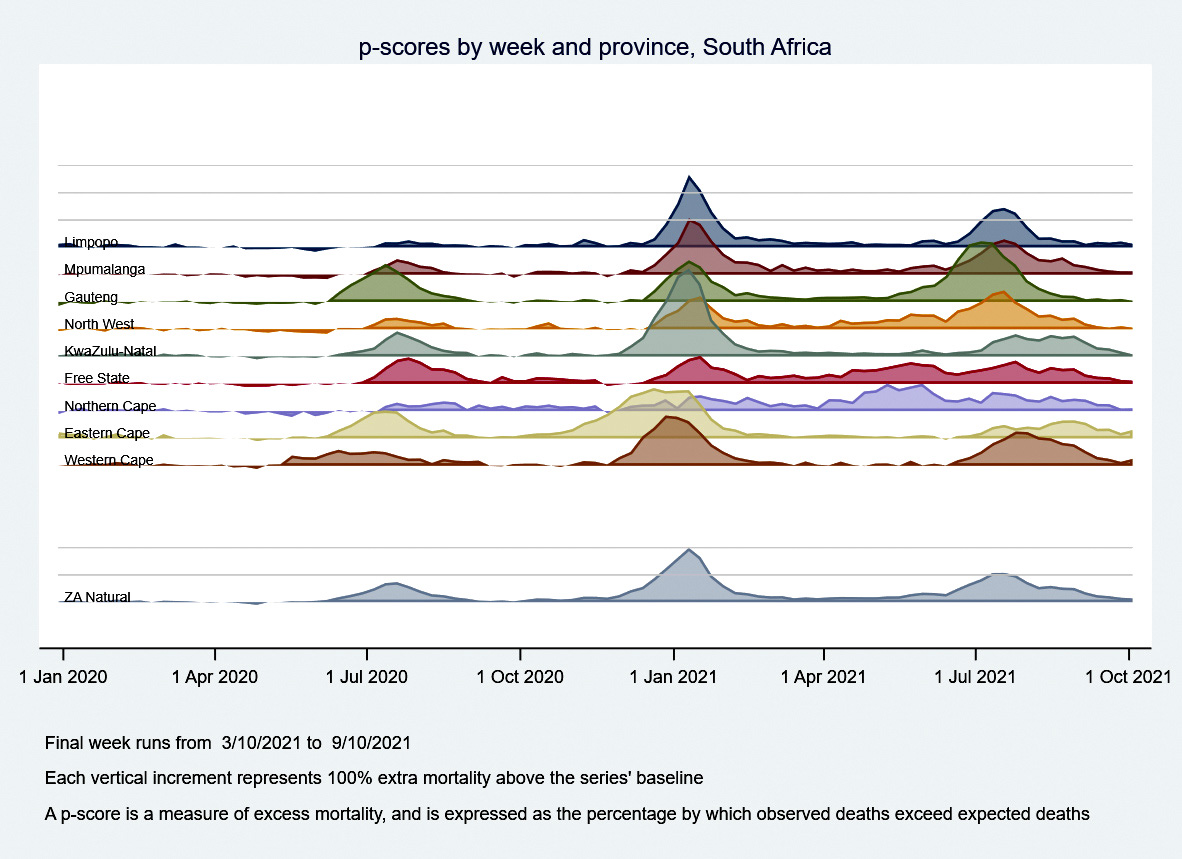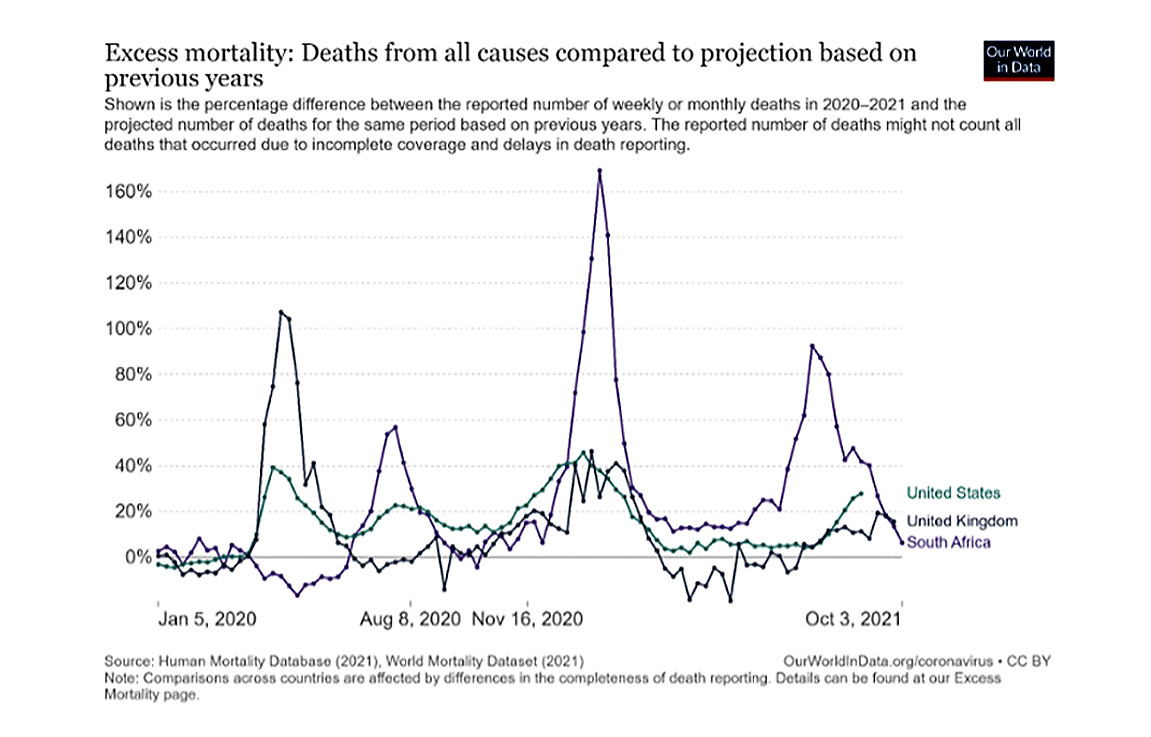EXCESS DEATHS
264,809 deaths later: Covid-19’s terrifying toll on South Africa, almost three times the official figure

How does South Africa measure the scale of its Covid-19 epidemic? ‘Corpses are the one certainty. From the outset, scientists knew that counting deaths would give us the most accurate information about what is happening with the Covid epidemic in South Africa.’ That’s according to Tom Moultrie, professor of demography and director of the Centre for Actuarial Research at the University of Cape Town.
Responding to questions about the Covid-19 death rate in SA and the systems being used to quantify it, Tom Moultrie, director of UCT’s Centre for Actuarial Research, explained how since 3 May 2020, the SA Medical Research Council’s (MRC) Burden of Disease Research Unit had been meticulously recording the number of deaths reported to it by the National Population Register and contrasting this with historical data on deaths from 2014 to 2019.
The actual deaths reported are adjusted upwards by about 15% to take into account deaths of non-South Africans who are not on the population register, plus the fact that the Department of Home Affairs is not notified of every death.
On this basis, the MRC has been able to measure the “excess deaths” (the weekly observed number of deaths above that expected in any given week based on historical data) since the early days of the pandemic.
Every Wednesday, they publish an updated Report on Weekly Deaths in SA. The latest report records deaths up to 9 October 2021. It shows a total of 264,809 deaths, a figure far higher than the government’s official number of Covid deaths — 88,619 as of Monday.

A recent article in the journal Genus (read it here), co-authored by Moultrie and colleagues from the Centre for Actuarial Research at the University of Cape Town and the MRC’s Burden of Disease Research Unit, says the official number “almost certainly under-reports Covid-19 deaths as [it] only reflects those known to have died with a prior positive test for SARS-CoV-2, or who tested positive post-mortem, and is therefore heavily skewed to deaths occurring in healthcare facilities (both public and private) in the country.”
The group of scientists estimates that the actual number is “2.5 to three times higher than the official numbers of Covid-19 deaths” and that “the vast majority of [the excess] deaths are likely to be associated with Covid-19, although constraints on the healthcare system during the ‘surge’ of deaths may also have resulted in a greater number of collateral deaths”.
What they mean is that although the “vast majority” of excess deaths are due directly to Covid-19, others occur as a result of the “collateral” stress on other health services and programmes caused by lockdowns and severe disruption in routine access to services, that may be caused by events like the closure of Charlotte Maxeke hospital in Johannesburg.
As a result, demographers and actuarial scientists are watching closely to try to see what impact the Covid responses may have in an increase in deaths due to HIV, TB and the delayed care and treatment of non-communicable diseases such as cancer and diabetes.
The World Health Organisation, for example, has just reported an increase in deaths due to TB for the first time in a decade in the 30 countries with the highest burden of TB — of which SA is one.
In an analysis of the MRC’s excess deaths reports, a recent article by Nathan Geffen and Alex Welte draws links between the excess deaths that were caused by Aids in the early 2000s and those caused by Covid-19 over the past two years.
“Aids still kills about 70,000 people in South Africa a year (about a quarter of its mid-2000s peak). On top of this, there’s tuberculosis. Because of the combined effect of these three epidemics, nearly as many people will die this year as in 2005 or 2006, the years with the most recorded South African deaths,” they point out.
Statistics South Africa, in a report issued on 19 July before the devastating third wave which led to more than 100,000 deaths between June and September, pointed out how Covid had caused an “increase in the crude death rate from 8.7 deaths per 1,000 people in 2020 to 11.6 deaths per 1,000 people in 2021”.
Stats SA says “the significant rise in deaths in 2021 (approximately 34%), meant a drop in the 2021 life expectancy at birth for males from 62.4 in 2020 to 59.3 in 2021 (3.1 year drop) and from 68.4 in 2020 to 64.6 for females (3.8 year drop)”.
Indicative of the seriousness of the pandemic, Prof Glenda Gray, president of the MRC, says that in 2021, Covid-19 has overtaken HIV as the leading cause of death in South Africa.
Inequality of Covid risk
The figures produced by the MRC also point to the wide disparities and inequalities of outcomes in death rates by province.
For example, the excess death rate in the Eastern Cape is 527 per 100,000 of the population, compared with 344 in the Western Cape.

This may be explained by a number of factors, including population density, different waves, variants impacting differently at different times and the quality of health services and their management by politicians and the health department during the pandemic.

(Graph provided by Tom Moultrie)
Put bluntly, if you are poor, the quality of health services and the province you live in may influence your chances of surviving Covid-19.
Maverick Citizen tried to test the MRC data with the actual experience of healthcare facilities in some of SA’s rural provinces.
The medical manager of a district hospital in the Free State agreed. He told us: “We have had a very high mortality rate in our hospital in the last two waves and, during analysis, the majority were very sick on arrival, elderly and died less than 24 hours after admission. In summary, they were late presenters and only accessed the health system once very sick.
“In addition, there have been excess community deaths in the district. I believe all the hospitals are vigorously testing anyone that has any suspicion of Covid, but I believe a lot of home deaths were missed. There is a system in place to test home deaths, but I’m not sure how successful it has been in getting to all the community deaths.”
In the Eastern Cape, the World Health Organization was brought in to investigate the exceptionally high death rate. Its report is awaited.
Based on the MRC data, recent reports and comparison with other countries’ excess death data now reveal that South Africa has been one of the worst-affected countries in the world. As the table below illustrates, we have a far higher proportion of excess deaths than either the US or the United Kingdom.

At the moment, South Africa is in a trough at the end of the third wave, but a fourth wave seems highly likely. If the public understood that the third wave had led to more than 100,000 deaths, one wonders whether there would not be greater urgency in vaccine take-up which, David Harrison estimates, could prevent 20,000-30,000 deaths in a fourth wave.
This begs the question about why this data is not getting more attention from the government. According to the scientists, it has “not found widespread purchase in the government response to the pandemic”.
Foster Mohale, spokesperson for the Minister of Health, told us on Monday that “there is an ongoing effort to consolidate data sources for Covid-19 mortality… involving Department of Health, NICD and SAMRC”.
Mohale admitted that “we are not sure if the NCCC (National Coronavirus Command Council) are looking at excess death data”, adding that “the problem has been differential mortality reporting by provinces and in a nutshell, the national figures are underestimating the true deaths. We would then need to publish revised death stats”.
If following the science and the evidence is truly a mantra of the government’s response to Covid, it should extend to publishing the most accurate data on deaths. That might help many more people understand the severity of the Covid crisis, and give some much-needed vooma to our vaccination programme. DM/MC
"Information pertaining to Covid-19, vaccines, how to control the spread of the virus and potential treatments is ever-changing. Under the South African Disaster Management Act Regulation 11(5)(c) it is prohibited to publish information through any medium with the intention to deceive people on government measures to address COVID-19. We are therefore disabling the comment section on this article in order to protect both the commenting member and ourselves from potential liability. Should you have additional information that you think we should know, please email [email protected]"




 Become an Insider
Become an Insider